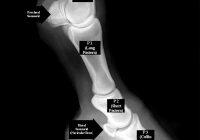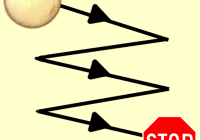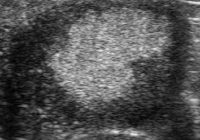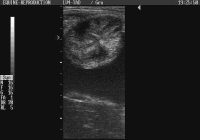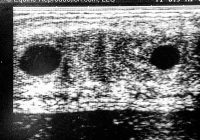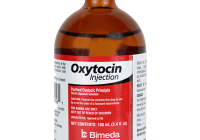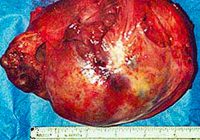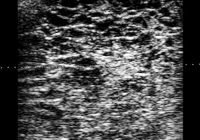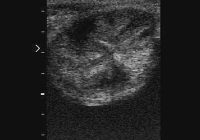A New Method to Estimate Fetal Age in the Mare Sometimes there arises a need to estimate fetal age in the mare, for which a breeding date perhaps is unknown. Several methods have been previously identified, such as measurement of the fetal eye[1][2], or biparietal diameter, eye approximated volume, fetal aortic diameter and femur length[3], among others. These… Read More »
Cessation of migration (fixation) of the embryonic vesicle – Is cessation of migration (fixation) of the embryonic vesicle inextricably linked to days 15-17 of pregnancy? By Professor John Newcombe, BVetMed, MRCVS Is cessation of migration (fixation) of the embryonic vesicle inextricably linked to days 15-17 of pregnancy? Introduction The ability of the embryo to signal to the endometrium… Read More »
Seasonal absence of accessory ovulations in pregnant mares: What is the need for eCG? – Secondary ovulations or luteal developments support early pregnancy – but what if there is a seasonal absence of accessory ovulations? By John R Newcombe, Equine Fertility Clinic, Warren House Farm, UK Introduction Years before the use of diagnostic ultrasound, WE Allen noticed that secondary… Read More »
Evidence that embryo migration (translocation) is not always if ever, necessary for the successful signalling or reception of the Maternal Recognition of Pregnancy (MRP) in the mare – Long thought to be connected, embryo migration and maternal recognition may not be so closely related after all. By Professor John Newcombe, BVetMed, MRCVS A Case Study By tracking the… Read More »
Ultrasound Characteristics of the Uterus in the Cycling Mare and their Correlation with Steroid Hormones and Timing of Ovulation – By Jonathan Pycock, BVetMed, PhD, DESM, MRCVS, RCVS Specialist in Equine Reproduction – Steroid Effects on Uterine Ultrasound in the Mare By Jonathan F Pycock, BVetMed, PhD, DESM, MRCVS, RCVS Specialist in Equine Reproduction The introduction of transrectal… Read More »
Managing Twinning in the Mare – While most equine pregnancies are simple, twinning when it happens is an issue. Here we discuss managing twinning in the mare. By Jos Mottershead and Kathy St. Martin You’ve read all the articles at Equine-Reproduction.com, your mare was in heat, you jumped through all the various hoops you needed to in order… Read More »
Oxytocin use in the mare during breeding – Delayed Uterine Clearance and Breeding-Induced Endometritis problems can be helped by Oxytocin use when breeding a mare! By Jos Mottershead Oxytocin acts on smooth muscle in the body, causing it to contract. One such area of tissue, which is of tremendous importance relative to breeding, is the mare’s uterus and… Read More »
Granulosa Cell Tumor – Capable of affecting reproductive ability and overall disposition, the GCT is one of the most common ovarian tumors to be found in the mare. By Jos Mottershead Granulosa cell tumors – GCT – or granulosa-thecal cell tumors are one of the most common ovarian tumors to be found in equines. They are usually benign… Read More »
Persistent Anovulatory Follicles – Anovulatory Hemorrhagic Follicles, Luteinized Unruptured Follicles, PAFs, AHFs, LUFs – all follicular headaches in the mare! By Jos Mottershead You’re following a mare’s follicular development using ultrasound prior to breeding and are relieved to see a good sized follicle developing. Unusually, the follicle continues to develop beyond the size at which you normally see… Read More »
Indications of Impending Ovulation in the Mare – Predicting ovulation in the mare can be a challenge with mares displaying different characteristics. Here we describe some common signs. By Jos Mottershead Predicting ovulation in the mare can be difficult, as they have the capacity to be notoriously unpredictable in their timing! This can lead to frustration, aggravation and… Read More »

